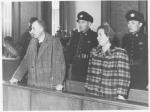
Tweeluik over het herstel van de rechtsstaat na de Tweede Wereldoorlog
After a period of extreme repression, genocide and arbitrariness, the reckoning with NSB members and collaborators constituted the first test for the restoration of the Dutch liberal-democratic rule of law. Suspects were held accountable through a special justice system and the purging of various professional groups.
The ongoing discussions on various aspects of this history and the disclosure of this Centraal Archief van de Bijzondere Rechtspleging(CABR) in 2025 invite new reflection in the form of a series of longreads and a book.
Longreads
CABR's vast and multifarious archive has always been of limited public access. From 2025, the files will become publicly accessible and digitally viewable. It is to be expected that this will raise many questions from society.
To give users context to the complex and sometimes unexpected or contradictory information they find in the digital collection, we are creating a series of ten longreads on partial aspects of special justice. The longreads will appear online from January 2025
Book
The purge of the Dutch civil service has remained a controversial aspect of the post-war restoration of the rule of law. Citizens' interests and expectations clashed with those of the restoration legislators, after which the image of a failed purge lingered.
A book for a wide audience provides background and depth to current debates. We take a bottom-up approach, studying purification at the local level in the context of societal factors. The book will be published in 2027.




